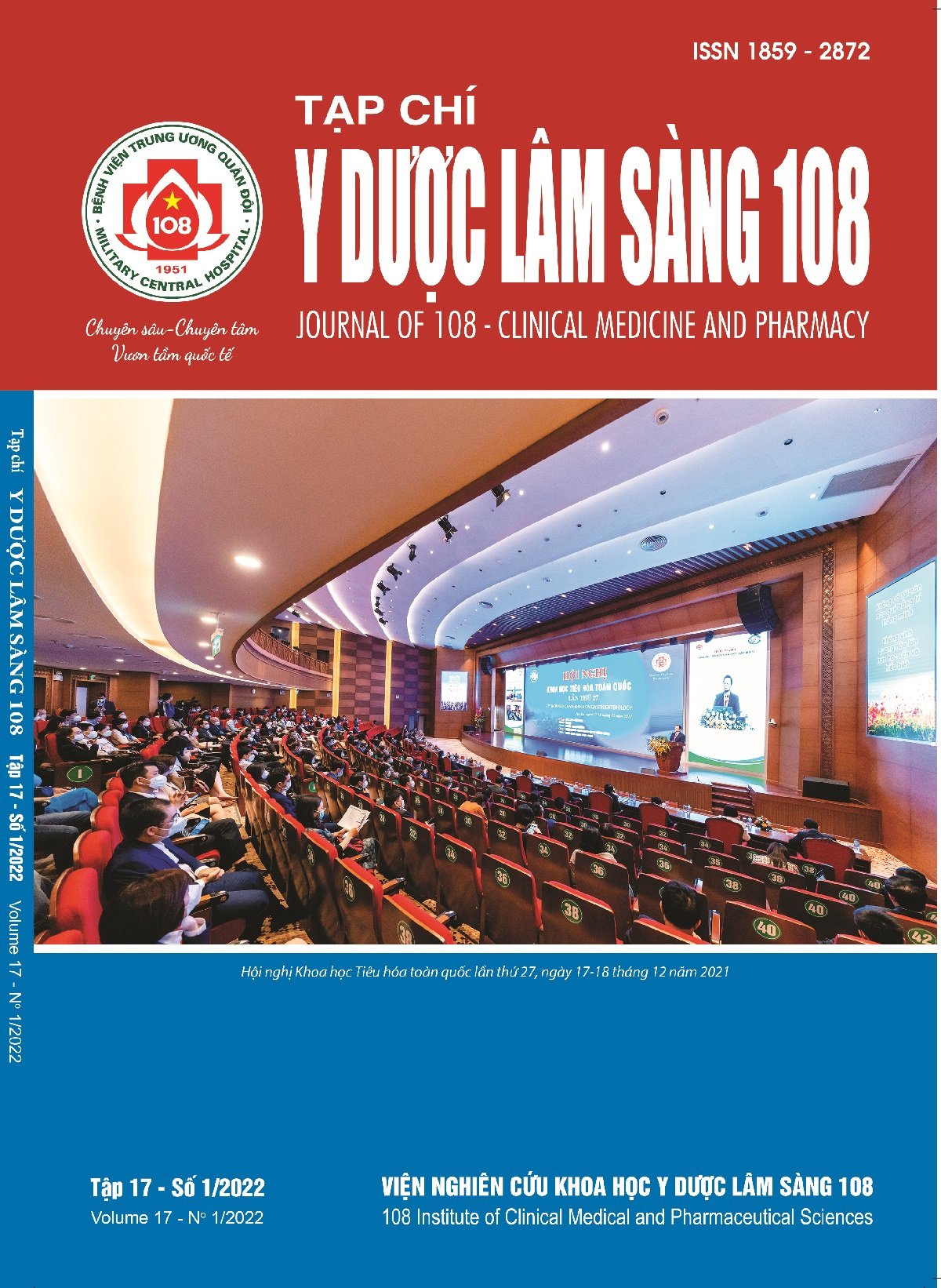The relationship between lymph node metastasis and overall survival after thoracoscopic surgery for non-small cell lung cancer
Main Article Content
Keywords
Abstract
Objective: To find out the relationships between lymph node metastasis and overall survival in non-small cell lung cancer patients post surgical treatment. Subject and method: Ninety-eight patients who had undergone thoracoscopic lobectomy and lymph node dissection from May 2017 to March 2021. Statistics of metastatic lymph node characteristics, pathologic staging, overall survival. Analyzing the relations between the lymph node metastasis and overall survival. Result: The rate of lymph node metastasis was 31.6%, N2 skip metastasis 9.2%, N2 non-skip metastasis 11.2%. Mean overall survival time was 43.2 ± 1.6 months; 1, 2, 3, 4-year overall survival was 96.8%, 88.9%, 70.4%, 61.8%, respectively. There were significant differences of overall survival among pathologic staging, number of lymph node metastasis. Conclusion: Metastatic lymph node charateristics and pathologic staging were associated with overal survival in non-small cell lung cancer patient after thoracoscopic lobectomy and lymph node dissection.
Article Details
References
2. Detterbeck FC et al (2017) The eighth edition lung cancer stage classification. Chest 151(1): 193-203.
3. Hishida T et al (2016) Lobe-specific nodal dissection for clinical stage I and II NSCLC: Japanese multi-institutional retrospective study using a propensity score analysis. Journal of Thoracic Oncology 11(9): 1529-1537.
4. Li S et al (2018) Degree of pulmonary fissure completeness can predict postoperative cardiopulmonary complications and length of hospital stay in patients undergoing video-assisted thoracoscopic lobectomy for early-stage lung cancer. Interactive cardiovascular thoracic surgery 26(1): 25-33.
5. Lee S et al (2016) Pulmonary fissure development is a prognostic factor for patients with resected stage I lung adenocarcinoma. Journal of surgical oncology 114(7): 848-852.
6. Sakurai H et al (2015) Clinicopathologic features of resected subcentimeter lung cancer. The Annals of thoracic surgery 99(5): 1731-1738.
7. Tantraworasin A et al (2017) Impact of lymph node management on resectable non-small cell lung cancer patients. J Thorac Dis 9(3): 666–674.
8. Trần Minh Bảo Luân và Vũ Trí Thanh, Các yếu tố tiên lượng thời gian sống còn sau phẫu thuật điều trị ung thư phổi không tế bào nhỏ. Tạp Chí Phẫu thuật Tim mạch Và Lồng ngực Việt Nam, 23: 75-85.
9. Nguyễn Khắc Kiểm (2016) Nghiên cứu nạo vét hạch theo bản đồ trong phẫu thuật điều trị ung thư phổi không tế bào nhỏ giai đoạn I - II - IIIA. In Ngoại lồng ngực. 2016, Đại học Y Hà Nội.
10. Ishiguro F et al (2010) Effect of selective lymph node dissection based on patterns of lobe-specific lymph node metastases on patient outcome in patients with resectable non–small cell lung cancer: A large-scale retrospective cohort study applying a propensity score. The Journal of thoracic cardiovascular surgery 139(4): 1001-1006.
11. Cerfolio RJ et al (2018) The long-term survival of robotic lobectomy for non-small cell lung cancer: A multi-institutional study. J Thorac Cardiovasc Surg 155(2): 778-786.
12. Wang L et al (2015) Prognostic factors for surgically managed patients with stage II non-small cell lung cancer. Int J Clin Exp Med 8(1): 862-868.
13. Akçay O et al (2017) Skip metastasis in non-small cell lung cancer: Does it affect the prognosis. Turk Gogus Kalp Dama 25: 230-234.
14. Li X et al (2019) Survival benefit of skip metastases in surgically resected N2 non-small cell lung cancer: A multicenter observational study of a large cohort of the Chinese patients. Eur J Surg Oncol 46(10 Pt A): 1874-1881.
 ISSN: 1859 - 2872
ISSN: 1859 - 2872
